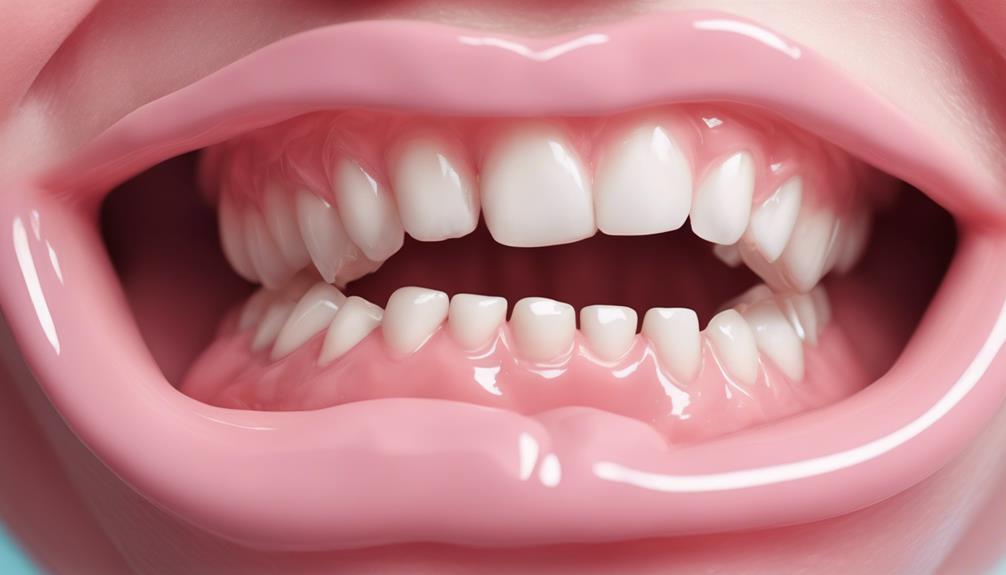As new parents, we understand that 40% of babies experience tooth decay before they turn five. It’s crucial to understand the significance of taking care of a baby’s gums, as it establishes the foundation for maintaining good dental health for life.
The proper techniques and steps involved may seem overwhelming at first, but taking the time to learn and implement them can make a significant difference in your child's dental well-being. By exploring this step-by-step guide, you'll gain valuable insights into how to care for your newborn's gums effectively and guarantee a healthier smile for the future.
Key Takeaways
- Cleaning newborn gums prevents tooth decay and lays the foundation for good oral health.
- Regular gum care supports healthy tooth development and oral hygiene.
- Techniques like using a damp cloth and teething rings ease discomfort and promote gum health.
- Consistent gum care routines from early stages reduce infection risks and support oral development.

Baby Grooming Kit, Infant Safety Care Set with Hair Brush Comb Nail Clipper Nasal Aspirator,Baby Essentials Kit for Newborn Girls Boys (Pink)
14 in 1 Baby Grooming Kit: The package comes with the baby grooming kit, including baby nail file,…
As an affiliate, we earn on qualifying purchases.
As an affiliate, we earn on qualifying purchases.
Importance of Newborn Gum Care
Understanding why newborn gum care is essential can lay the foundation for excellent oral health in your little one's future. Even before that first tooth comes in, taking care of your baby's gums is important. Using a soft, damp cloth or gauze to gently clean their gums helps prevent bacteria buildup and potential oral health issues. It's not just about cleanliness; it's about instilling good habits early on. By starting with gum care, you're preparing your baby for future toothbrushing routines and promoting healthy gum development.
Regular gum cleaning isn't only about oral hygiene; it can also alleviate discomfort during teething. Those sore gums can find relief through gentle cleaning. Additionally, starting early with gum care can greatly reduce the risk of early tooth decay. So, by incorporating this simple practice into your baby's routine, you're setting them up for a lifetime of good oral health habits and well-being.

EASICUTI 40Pcs Baby Finger Toothbrush, Dry Wipes Baby Toothbrush, Baby Tongue Cleaner, Newborn Tooth and Gum Wipes, BAB y Oral Cleaner, Infant Toothbrush Mouth Clean for 0-36 Month
👍【Professinal Design】Our baby tongue cleaner has Super Soft top and edges, very comfortable for baby use, no sharp…
As an affiliate, we earn on qualifying purchases.
As an affiliate, we earn on qualifying purchases.
Development of Baby Gums

As baby gums develop, they provide the important foundation for the emergence of future teeth. Baby gums start forming while the baby is still in the womb, preparing for the arrival of baby teeth. These soft and sensitive gums cover the underlying jawbone, where the baby teeth will eventually break through, playing a significant role in supporting and protecting the emerging baby teeth. Regular care and cleaning of baby gums are essential for maintaining oral hygiene and promoting healthy tooth development. By gently caring for these delicate gums, we can guarantee a strong foundation for the baby's teeth to come.
| Key Points | Description | Importance |
|---|---|---|
| Soft and Sensitive Gums | Baby gums are delicate and easily irritated, requiring gentle care and attention. | Protecting the gums promotes oral health. |
| Emerging Baby Teeth | The gums provide a protective barrier for the emerging baby teeth as they break through. | Proper care ensures healthy tooth growth. |
| Regular Cleaning | Regularly cleaning baby gums helps remove bacteria and maintain good oral hygiene. | Prevents issues like plaque buildup. |

3 Pack Ring Teether Baby Infant Toys, Baby Essentials, Silicone Teething Ring Toys for Babies 0-6 Months, Seposeve Toddler Teethers 6-12 Months 12-24 Months, Infant Teething Relief, Purple Pink White
5 Teething Textures: Cute and funny teether ring toy design with 5 different textures and bristles on both…
As an affiliate, we earn on qualifying purchases.
As an affiliate, we earn on qualifying purchases.
Techniques for Cleaning Gums
Baby gums require gentle and consistent cleaning to maintain oral hygiene and prepare for the emergence of baby teeth. Here are some techniques for cleaning your baby's gums effectively:
- Use a clean, damp cloth: After each feeding, gently wipe your baby's gums with a clean, damp cloth or gauze to remove bacteria and milk residue.
- Start early: Begin cleaning your baby's gums even before the first tooth appears to establish good oral hygiene habits from the start.
- Guarantee comfort: Make sure your baby is comfortable and secure during the cleaning process to create a positive experience for them.
- Prevent bacteria buildup: Regular gum cleaning helps prevent bacteria buildup, potential infections, and prepares the baby for the arrival of teeth.
- Establish routines: Consistent gum cleaning helps your baby become accustomed to oral care routines, promoting better dental health as they grow.

Nuby Soft Silicone Gum Massager with Hygienic Case, 2-Pack, 3 m+
All Silicone Gum Massager: The 2 pack silicone gum massager feature soft massaging bristles that massage and clean…
As an affiliate, we earn on qualifying purchases.
As an affiliate, we earn on qualifying purchases.
Managing Teething Discomfort

To help alleviate teething discomfort in infants, consider using chilled teething rings or washcloths for them to chew on. Teething discomfort typically begins around 4-7 months of age, with symptoms like increased drooling and irritability. Offering a chilled teething ring can help soothe their gums as they gnaw on it, providing relief from the pain and pressure associated with emerging teeth.
Another method is gently massaging the baby's gums with a clean finger to ease their discomfort. If your baby's symptoms persist or if you have any concerns, consulting with a pediatrician is advisable to make sure proper management of teething discomfort. By proactively addressing your baby's teething discomfort through these methods, you can help them feel more comfortable during this natural developmental stage.
Preventing Gum-Related Issues
Regular gum care for newborns is important in preventing gum-related issues and promoting healthy oral development from the start. When it comes to dental care for infants, keeping their gums clean is vital in maintaining good oral hygiene.
Here are some tips to help prevent gum-related problems:
- Clean gently: Use a clean finger or a soft, damp cloth to gently clean your newborn's gums after feedings. This helps remove bacteria and milk residue.
- Prevent inflammation: Regular, gentle gum cleaning can prevent gum inflammation and discomfort for your little one.
- Reduce infection risk: Keeping newborn gums clean reduces the risk of oral infections, promoting overall oral health.
- Establish a routine: Setting up a gum care routine early on lays the foundation for good oral hygiene practices as your child grows.
- Promote healthy development: By caring for your newborn's gums, you're supporting their oral development even before their teeth come in.
Frequently Asked Questions
How Do You Take Care of a Newborn's Gums?
We clean a newborn's gums after each feeding with a damp cloth or gauze pad. Gentle circular motions help remove milk residue and bacteria, maintaining oral hygiene and preparing for future teeth. Starting early builds good habits and promotes a healthy mouth.
When Should I Start Brushing My Newborn's Gums?
We start brushing our newborn's gums right away to foster excellent oral health habits early on. Gently wiping gums after feedings helps prevent bacteria buildup. Establishing this routine sets the stage for good dental care as they grow.
When Should I Start Cleaning My Newborn's Mouth?
We should start cleaning our newborn's mouth from birth. Using a damp cloth or gauze after feeds helps maintain oral hygiene. Early care establishes good habits. Cleaning prevents bacteria buildup and supports overall oral health. Consult professionals for proper techniques.
Do I Need to Wash Newborn Gums?
Oh, absolutely! Keeping newborn gums clean is essential. We gently wipe them after feedings to prevent bacteria buildup. It's a simple step that sets the stage for healthy teeth. Trust us, it's worth it!
Conclusion
Let's remember: caring for newborn gums is like planting seeds in a garden – start early, nurture gently, and watch them grow strong.
By following these steps, we can make sure our little ones blossom with healthy smiles for years to come.
So let's keep up the good work, keep those gums clean, and keep those smiles bright!









